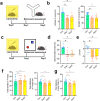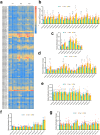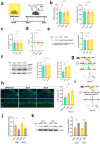GABAB receptor activation contributes to post-surgery cognitive impairments in mice by inducing hippocampal BDNF hypermethylation
- PMID: 40693442
- PMCID: PMC12284989
- DOI: 10.1080/07853890.2025.2536221
GABAB receptor activation contributes to post-surgery cognitive impairments in mice by inducing hippocampal BDNF hypermethylation
Abstract
Background: Clinical observations have shown that brain-derived neurotrophic factor (BDNF) expression is reduced in patients with impaired cognitive function after anaesthesia and surgery. Abnormal epigenetic changes may contribute to this condition. The role of the GABAergic system, which is crucial in anaesthetic mechanisms and cognitive function, requires further investigation to determine whether it affects BDNF epigenetic regulation and cognitive outcomes.
Materials and methods: Experiments employed a mouse model perioperative neurocognitive disorder (PND) that comprised laparotomy under isoflurane inhalation anaesthesia. Mice were subjected to behavioural assessments, including the Y-maze and novel object recognition tests for cognitive function and molecular analyses (quantitative polymerase chain reaction, qPCR) and methylation-specific PCR to assess BDNF expression and epigenetic modifications. GABAB receptor deactivation was induced by a selective antagonist and changes in BDNF expression and gene methylation were measured.
Results: Aged mice in the PND model had reduced BDNF expression in hippocampal neurons. BDNF protein reduction was linked to increased methylation of the Bdnf gene, initiated by GABAB receptor activation and hyperphosphorylation of downstream signalling proteins. Furthermore, BDNF overexpression experiments demonstrated a partial reversal of cognitive impairment in mice, supporting a causal role for BDNF methylation in PND.
Conclusions: This study emphasizes the vital interaction between the GABAergic system and the epigenetic control of Bdnf, shedding light on the mechanisms underlying anaesthesia-related cognitive impairment. Our findings suggest that inhibition of GABAB receptor activation to reverse BDNF hypermethylation may represent a potential therapeutic strategy for alleviating PND.
Keywords: GABAergic; anaesthesia and surgery; brain-derived neurotrophic factor; epigenetic methylation; perioperative neurocognitive disorder.
Conflict of interest statement
No potential conflict of interest was reported by the author(s).
Figures






Similar articles
-
Gamma Oscillation Disruption Induced By Microglial Activation Contributes to Perioperative Neurocognitive Disorders in Aged Mice.J Mol Neurosci. 2025 Aug 2;75(3):97. doi: 10.1007/s12031-025-02380-1. J Mol Neurosci. 2025. PMID: 40753364
-
Fasudil Alleviates Postoperative Neurocognitive Disorders in Mice by Downregulating the Surface Expression of α5GABAAR in Hippocampus.CNS Neurosci Ther. 2024 Nov;30(11):e70098. doi: 10.1111/cns.70098. CNS Neurosci Ther. 2024. PMID: 39491498 Free PMC article.
-
Intravenous versus inhalational maintenance of anaesthesia for postoperative cognitive outcomes in elderly people undergoing non-cardiac surgery.Cochrane Database Syst Rev. 2018 Aug 21;8(8):CD012317. doi: 10.1002/14651858.CD012317.pub2. Cochrane Database Syst Rev. 2018. PMID: 30129968 Free PMC article.
-
Direct inhibition of cystathionine-β-synthase by isoflurane contributes to delayed neurocognitive recovery after isoflurane general anaesthesia in mice.Br J Anaesth. 2025 Aug;135(2):360-374. doi: 10.1016/j.bja.2025.03.044. Epub 2025 Jun 6. Br J Anaesth. 2025. PMID: 40483182
-
Regional (spinal, epidural, caudal) versus general anaesthesia in preterm infants undergoing inguinal herniorrhaphy in early infancy.Cochrane Database Syst Rev. 2015 Jun 9;2015(6):CD003669. doi: 10.1002/14651858.CD003669.pub2. Cochrane Database Syst Rev. 2015. PMID: 26058963 Free PMC article.
References
MeSH terms
Substances
LinkOut - more resources
Full Text Sources
